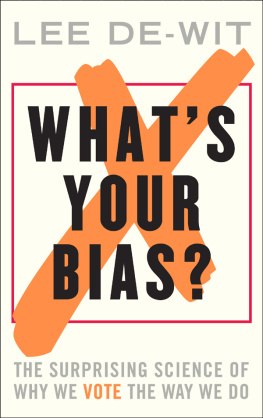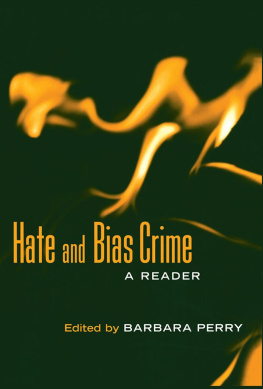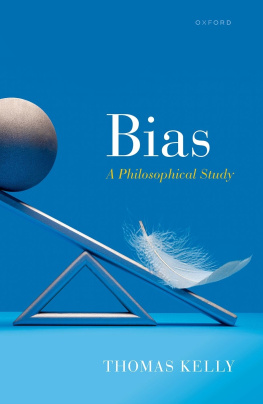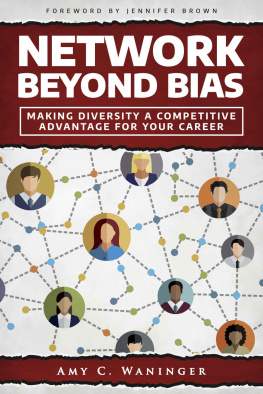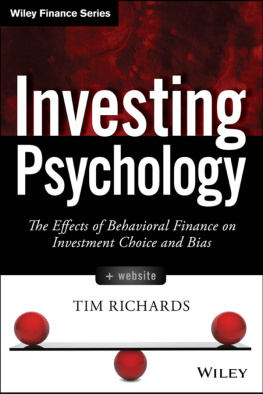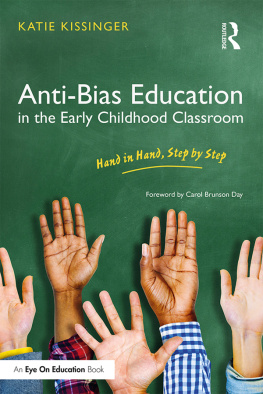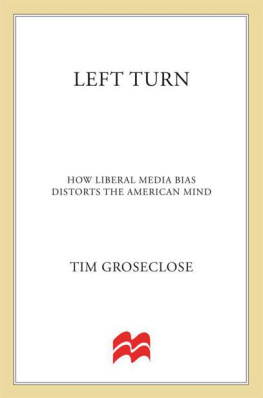De-Wit - Whats Your Bias?
Here you can read online De-Wit - Whats Your Bias? full text of the book (entire story) in english for free. Download pdf and epub, get meaning, cover and reviews about this ebook. year: 2016, publisher: Independent Publishers Group, genre: Politics. Description of the work, (preface) as well as reviews are available. Best literature library LitArk.com created for fans of good reading and offers a wide selection of genres:
Romance novel
Science fiction
Adventure
Detective
Science
History
Home and family
Prose
Art
Politics
Computer
Non-fiction
Religion
Business
Children
Humor
Choose a favorite category and find really read worthwhile books. Enjoy immersion in the world of imagination, feel the emotions of the characters or learn something new for yourself, make an fascinating discovery.
Whats Your Bias?: summary, description and annotation
We offer to read an annotation, description, summary or preface (depends on what the author of the book "Whats Your Bias?" wrote himself). If you haven't found the necessary information about the book — write in the comments, we will try to find it.
Whats Your Bias? — read online for free the complete book (whole text) full work
Below is the text of the book, divided by pages. System saving the place of the last page read, allows you to conveniently read the book "Whats Your Bias?" online for free, without having to search again every time where you left off. Put a bookmark, and you can go to the page where you finished reading at any time.
Font size:
Interval:
Bookmark:


THE POLITICAL ANIMAL
P olitical certainties are like the Berlin Wall. They appear to be concrete and immoveable, but they can crumble and fall almost overnight. In the last two years we have seen a particularly noticeable accumulation of such rubble, with political pundits as surprised as the rest of us by event after unforeseen event.
Donald Trump wasnt expected to win the Republican nomination, let alone become president; UKIP was meant to be a sideshow in the UK, and Nigel Farage just the drunk uncle of British politics; and the polls promised Theresa May a thumping majority in the 2017 election, not a net loss of twelve seats.
So what do all of these confounding results tell us?
Well, firstly, it seems to be increasingly difficult to predict how people are going to vote. And secondly, we are witnessing the emergence of huge, and sometimes painful, political schisms.
Delve into this a little further, and it looks like many traditional political loyalties are starting to break down. Class is increasingly less important as a predictor of voting in the UK, and the customary labels of left and right wing are becoming less clearly defined.
A range of curious correlations are also emerging between the way people vote and their psychological profile. In the EU referendum, for example, although class and education level were clearly correlated with how people voted, there was also a surprising link with views on capital punishment: according to Stian Westlake, head of research at the think tank Nesta, class status and income yielded 55 per cent accuracy as to voter intention (thats significant, but not all that significant when you consider that a guess would give you 50 per cent). However, the answers to questions such as, Do you think criminals should be publicly whipped? or Are you in favour of the death penalty? yielded over 70 per cent accuracy for an out vote.
Is this simply coincidence? Or is there something about the psychology of voters that creates this connection?
In this book, I want to examine these kinds of correlations from a different angle. I want to get under the skin of our political decision-making to try to discover whether there are meaningful psychological differences that predict and influence how we vote.
Im not intending to offer an academic overview of political psychology; my primary focus is on the politics and trends of Western democracies; and Im not going to concentrate on many of the demographic factors (like age, class and education) traditionally identified in political science as important predictors of how we vote. Rather Im going to try to bring the psychology of politics to life, by selecting some of the key studies and setting them in the context of contemporary politics.
The science underpinning the book can offer some genuine surprises. You probably take for granted, for example, that (on average) people are likely to vote in a similar way to their parents. That is correct, but you might be surprised to learn that a large part of the reason is not down to upbringing but because of genetic similarities. In fact, the link between our political attitudes and our genetics is probably one of the most robust findings in political psychology replicated in numerous studies since it was first demonstrated in the 1970s.
Ive said that people find this link surprising, but whats stranger still is that you might be more surprised if youre left wing; research suggests that people on the right are more likely to think that genes or biology affect human behaviour.
This doesnt mean, however, that our political attitudes are dictated by our genes; the way we look at the world and make decisions is shaped by many different factors. While we now know that genes influence the probability of holding certain political views (and even the likelihood of voting), we still dont know which genes are responsible for this. And we certainly dont know how they might cause complex behaviours. It is unlikely that genes directly determine our political beliefs; rather, our genetic make-up results in subtle physiological or neural differences that influence our world view, personality and, ultimately, our political opinions.
Over the course of this book we will see that political opinions and psychological biases are associated in ways that we (both voters and researchers) often find surprising. Again, the fact that we are so taken aback is significant; it shows that we are not aware of some of the reasons why we vote the way we do. But the truth is that these implicit or unconscious biases have an effect on many of the ways we behave.
Sometimes biases involve obviously prejudicial thoughts towards a certain group that may cause us to respond incorrectly or irrationally in some way. Indeed, sometimes a bias can clearly be defined as something that deviates from what is objectively correct, where our perception and beliefs simply dont match the facts. However, in many cases defining what is sensible or correct and what is irrational is far from straightforward (and may in fact be philosophically impossible for some issues).
Race and gender are two examples where unfortunately people still experience prejudice; however, these are also particularly complex topics that affect many aspects of our society beyond the scope of politics. Most of us are, at least in principle, aware of the difficulties posed by racism and sexism in society, and, as they are addressed in great detail in other books and articles, they are not tackled in this book. That might seem an odd exclusion, but I have tried to concentrate more on the biases and psychological influences that are less well known.
Many of the biases in this book reflect subtle intuitive responses that we make so effortlessly that we dont notice them at all. Sometimes our biases only become clear when we realise that not everyone responds in the same way. And, as we will see, that can help us understand why some people make different political choices.
Lets take the issues of nationalism and immigration, one of the areas in which there has perhaps been the most leftright polarisation in recent years. Political ideology (and, unfortunately, racism) plays a role here, but over the course of the book, Ill hopefully be able to show that there are also subtle and surprising differences in our moral intuitions that might colour our view of nationalism. Well take a look, for example, at the work of American social psychologist Jonathan Haidt, who has shown that responses to moral questions such as whether you would publicly bet against your favourite sports team, or whether you consider group loyalty more important than individual interests, can actually indicate whether you identify as left or right wing, and can be a good predictor of how people vote. And in turn, I think, that can help us to understand why nationalism is such a divisive issue.
These are the sorts of ideas we will explore in this book, looking at the many factors that shape the political animal: our world view, personality and the way we vote, and why they can make it so difficult to understand other points of view.
Well see how ideas about fairness affect our attitude to taxation and benefits; how the different ways we perceive and respond to threats can shape our attitude to immigration; how a persons appearance can cause us to make snap judgements on their competence; how we seek information that confirms our existing outlook and reject that which challenges it.
Next pageFont size:
Interval:
Bookmark:
Similar books «Whats Your Bias?»
Look at similar books to Whats Your Bias?. We have selected literature similar in name and meaning in the hope of providing readers with more options to find new, interesting, not yet read works.
Discussion, reviews of the book Whats Your Bias? and just readers' own opinions. Leave your comments, write what you think about the work, its meaning or the main characters. Specify what exactly you liked and what you didn't like, and why you think so.

